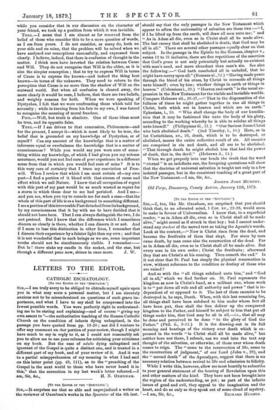[TO THE EDITOR OF THE "SPECTATOR. "] SIR, — It surprises me that
so able and unprejudiced a writer as , the reviewer of Ozenham's works in the Spectator of the 4th inst. I
should say that the only passages in the New Testament which appear to affirm the universality of salvation are these two :—"I, if I be lifted up from the earth, will draw all men unto me ; " and " As in Adam all die, even so in Christ shall all be made alive. The last enemy that shall be abolished is death, that God may be all in all." There are several other passages equally clear on that subject. In the passage in the Epistle to the Romans, chapter v., verses 12 to 21 inclusive, there are five repetitions of the assertion that God's grace is not only potentially but actually co-existent with man's need, and more abundant than man's sin. See also the following :—" God hath concluded all in unbelief, that he might have mercy upon all." (Romans xi., 32.) "Having made peace through the blood of his cross, by Christ to reconcile all things unto himself ; even by him ; whether things in earth or things in heaven." (Colossians i., 29.) "Heaven and earth" is the usual ex- pression in the New Testament for the visible and invisible worlds. Compare Hebrews xii., 26-27,—" That in the dispensation of the fullness of times he might gather together in one all things in Christ, both which are in heaven and which are on earth." Ephesians, i., 10. " Who shall change the body of our humilia- tion that it may be fashioned like unto the body of his glory, according to the working whereby he is able to subdue all things unto himself." (Philippians iii., 21.) " Our Saviour Jesus Christ who bath abolished death." (2nd Timothy, i., 10.) Here, as in 1st Corinthians, xv., 26, death, which is to be destroyed, or abolished, means the entire collective result of sin. All enemies are comprised in sin and death, and all are to be abolished. " That through death he might abolish him that had the power of death, that is, the devil." (Hebrews ii., 14.) When we get properly into our heads the truth that the word " eternal " is an indefinite one, the foregoing quotations will show that the doctrine of universal salvation is taught not only in a few isolated passages, but in the consistent teaching of a great part of the New Testament.—I am, Sir, &c., JOSEPH JOHN MURPHY.
Old Forge, Dunmurry, County Antrim, January 12th, 1879.


































 Previous page
Previous page